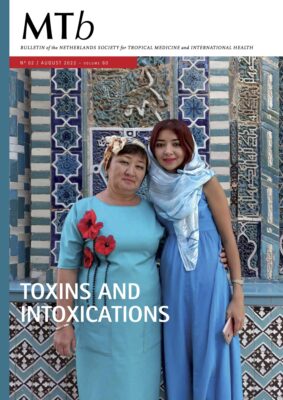

In this issue, we give examples of toxins and intoxications that occurred in the (recent) past or that are ongoing. Some affect the individual, others affect many; some are intentional, most are unwanted; some have a clear correlation with health, for others it is not yet clear. What is abundantly clear is that these threats to human health cannot and should not be ignored and deserve the same kind of attention as other conditions. Human health is threatened by many factors that may originate internally in the body such as myocardial...
In this issue, we give examples of toxins and intoxications that occurred in the (recent) past or that are ongoing. Some affect the individual, others affect many; some are intentional, most are unwanted; some have a clear correlation with health, for others it is not yet clear. What is abundantly clear is that these threats to human health cannot and should not be ignored and deserve the same kind of attention as other conditions. Human health is threatened by many factors that may originate internally in the body such as myocardial infarction or diabetes mellitus as well as by external factors. The latter include infections, trauma, or exposure to environmental factors with often serious consequences. Examples are domestic smoke (leading to COPD), stimulants such as betel nut (a carcinogen), khat (cardiovascular disease), coca leaves (oral carcinoma), or local brews containing methanol (may be fatal). A particularly serious category is exposure to teratogenic drugs such as thalidomide (Softenon™) in the 1960s leading to, among others, phocomelia (absence of limbs) in babies born to mothers who had taken this drug to combat morning sickness during pregnancy. A special category is accidental or intentional administration of a toxin in the context of homicide or suicide. These are often culturally determined as was the case in the (mostly) intentional acetic acid overdosing among citizens of the Netherlands Antilles and Surinam in the 1970-1980s. A similar suicide drug is para-phenylene diamine (PPD) that is used as a basis for hair dyeing and intensifying henna painting of the hands in women who are getting married. When swallowed, it leads to severe morbidity and mortality. Organophosphate poisoning (accidental or intentional) is common in low- and middle-income countries (LMICs), and clinical as well as epidemiological findings are presented in this issue. Large scale exposure to toxins may occur as in toxic olive oil scandal in Spain in the 1980s and the Bhopal industrial disaster in India (1984) with immediate and long-term effects on health. Other health risks include environmental pollution as was the case in the oil leakage scandal in the Niger River delta (Nigeria, starting in 1958). The oil destroyed the source of clean water and arable land for decades, threatening the means of existence of many living in the delta. Disasters due to radioactivity have also occurred, such as the Chernobyl disaster (Ukraine, 1986), where people died of radiation with large-scale environmental pollution. Similar damage to the environment with health risks resulted from the mining of uranium in Niger for example. In some cases, there is only a (strong) suspicion of a culprit; in the case of the increasing numbers of patients worldwide with Parkinson’s disease, only circumstantial evidence exists linking the use of pesticides to the occurrence of this disease. Neurologist Bas Bloem, Radboud Medical Center, Nijmegen, the Netherlands, is a world expert and advocate on this disease and co-author of a paper that we include in this issue. It is no coincidence that he was recently awarded the Stevin price of 2.5 million euros to stimulate research on this topic. Investment in research on the (longterm) health effects of exposure to toxins and intoxications, access to clinical care and psychological support, and support for justice being done and obtaining financial compensation are among the priorities in this neglected field of tropical medicine and global health.
Ed Zijlstra
Olga Knaven




















































